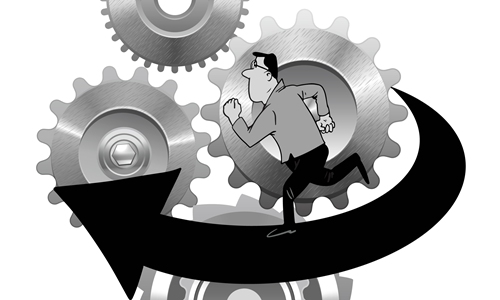HOME >> BUSINESS
Complementary economic relationship sets a strong foundation for trade takeoff
By Wang Jiamei Source:Global Times Published: 2019/11/14 22:31:09

Illustration: Luo Xuan/GT
With increasing awareness of the European economy's dependence on the Chinese market and its value chain, the China-EU relationship is expected to gain complexity in the foreseeable future.Alicia Garcia Herrero, chief economist for Asia-Pacific at French investment bank Natixis, pointed out in a recent report that, "EU Member states are generally becoming more integrated with China's value chain ... China imports increasingly fewer intermediate goods from the EU, but it exports increasingly more intermediates to EU member states for their re-export. The EU depends more on Chinese inputs for exports while China relies less on EU goods for its exports."
The growing dependence on China in terms of the industrial chain is not unique to the EU. In fact, the US is currently facing a similar situation with its huge demand for Chinese manufacturing to make up for its lack of an industrial chain, particularly for low-end goods. Since the beginning of the China-US trade war, US companies have reportedly been seeking exemptions to tariffs on a wide range of Chinese imports, ranging from automotive parts and mineral raw materials to obscure industrial commodities. Chinese products upon which US companies have grown reliant point to the vulnerabilities in a number of US industries.
The unwavering US demand for China's manufactured goods also explains why the latter's trade surplus with the US remains high amid the trade war. The latest data from the General Administration of Customs showed that in the first 10 months of this year, China's exports to the US fell by 6.8 percent year-on-year, while imports from the US fell by 21.5 percent, resulting in a trade surplus of 1.7 trillion yuan ($243.65 billion), up 0.8 percent compared with the same period last year.
Just as the US evidently needs products from China, there is no doubt that China is also in need of products from the US. China's imports from the US, however, are mostly from its high-end industrial chain. As the Chinese manufacturing sector is transforming and upgrading toward high-end industries like chips, aircraft and high-end equipment, it is likely to face fierce competition from manufacturing sectors not only in the US, but also in Japan, South Korea, Germany and other developed countries.
Nevertheless, industrial upgrading and transformation doesn't mean that China will simply stop developing its existing low-end industries. And for those in the developed world, it is impossible to return to middle and low-end industries and cut their reliance on Chinese supplies. Therefore, China's advantage in the middle and low-end industrial chain may be partially replaced by other developing countries, but will not be replaced completely in the short and medium run because no other country in the world can replace China's supply chain, which is the largest and most comprehensive.
That being said, China's dominant position in the middle and low-end value chain has now upset the EU. It is concerned that dependence on, and the structure of, trade integration with China may exert excessive impact on its own economy, thus influencing its political decisions regarding China. Such concern may have a point, particularly at a time when the entire EU economy is slowing. The European Commission last week cut its GDP growth forecast for the eurozone to 1.1 percent in 2019, and 1.2 percent in 2020 and 2021.
The German economy contracted 0.1 percent in the second quarter of this year and is expected to see a similar decline in the third quarter, according to some analysts. While the trade war, Brexit and other issues are said to have contributed to its sluggish performance, some critics say that, "The decades spent cultivating China as a destination for German exports has been to the detriment of local industry," read a Reuters report.
Although the EU has called China "an economic competitor in pursuit of technological leadership and a systemic rival promoting alternative models of governance" due in large part to its anxiety about China's rapid rise, it is an undeniable fact that China-EU economic and trade cooperation are inextricably linked. The EU will not give up the world's largest market, and China needs the EU's expansive, developed market. Therefore, with China's continuous opening-up and development, the China-EU relationship will likely face increasing complementary benefits and competition simultaneously, adding to the complexity of political and economic choices for both sides.
The author is a reporter with the Global Times. bizopinion@globaltimes.com.cn
Posted in: EXPERT ASSESSMENT